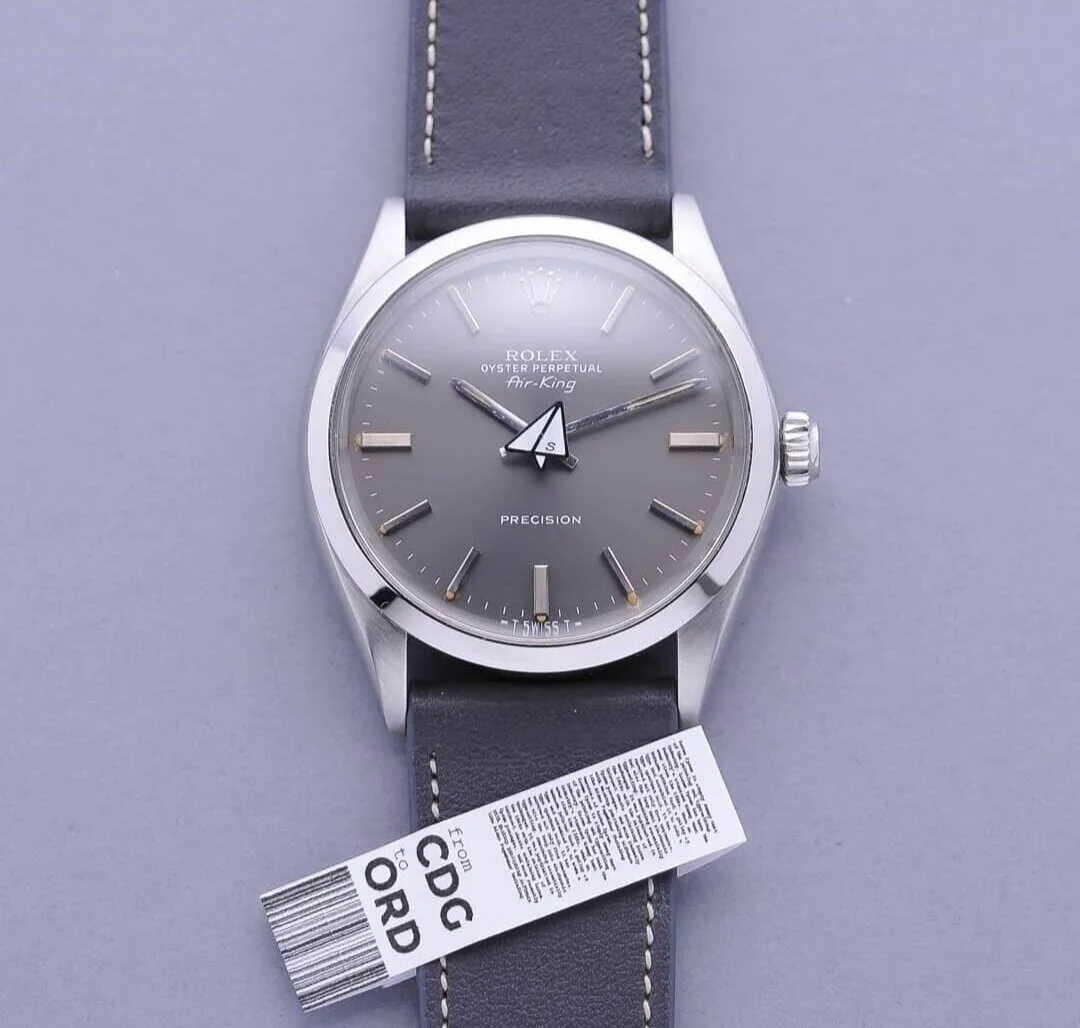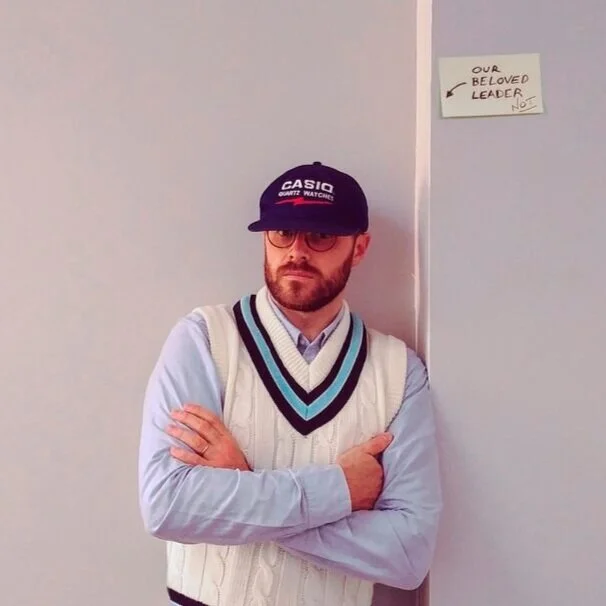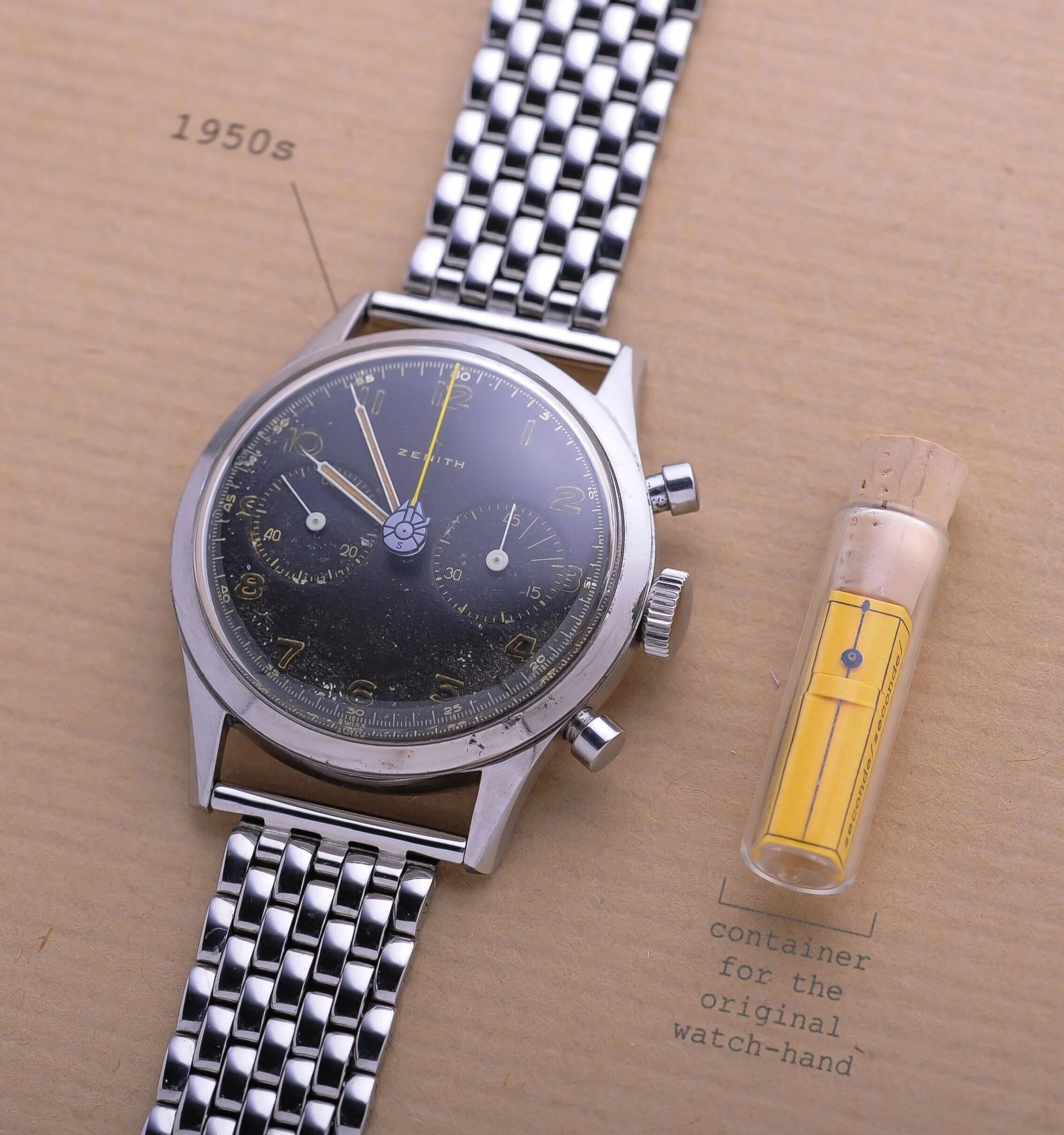Meet the Han Solo of vintage, fighting to make art of patina
Are watches art? It’s an oft-debated question: To answer in the affirmative is to imply that there are artists using watches as a medium of expression and creativity to explore new ideas.
“I feel more and more comfortable saying I’m an artist,” says Romaric André, the founder of France-based (Design studio? Art studio? Vintage dealer? “I play with hands on vintage watches”, Romaric modestly puts it with a mischievous smile) Seconde/Seconde. “But that puts some pressure on me to say I won’t do anything that’s not true to me as an artist. An artist has to say ‘fuck the convention, fuck the norm.’ I want to be edgy. I don’t want to do the simple things.”
Ostensibly, Seconde/Seconde is in the business of taking vintage watches and swapping out the original hands with emoji-like icons offering a play on the vintage piece. Think a Tiffany-stamped Patek Philippe Calatrava with a croissant for a hand, or a Dunhill-branded alarm watch with a flame. If you don’t get it, that’s on you.
“The watch hands are so figurative, so I try to compensate by being a little abstract,” Romaric said. That means you won’t find explanations of the pieces on Seconde/Seconde’s website or in Instagram captions.
Seconde/Seconde Limited Edition for MB&F M.A.D. Gallery
To keep purists pacified, Seconde/Seconde has a trick up its sleeve: It always includes the original watch hands with the customized timepiece. Still, Seconde/Seconde doesn’t just swap in any hand on any piece.
“I decline a lot of requests to put icons on watches when there is no link between the icons and the watches. I won’t do things just for money,” Romaric explains.
But to simply define Seconde/Seconde by what it does is to miss entirely what it is.
Just a Seconde
Seconde/Seconde officially launched at Baselworld in 2019 (RIP), where its first client was industry veteran William Massena. Since then, Seconde/Seconde has continued to inject life in an otherwise conservative industry. Romaric has displayed a capsule collection with MB&F’s MAD Gallery, which you’ll now find in MB&F’s new online shop, and continues to entertain Instagram followers daily.
Romaric is something of an industry veteran himself: A previous business of his slapped a tourbillon into a mobile phone, attracting interest and investment from members of the avante-garde like Richard Mille and Eduoard Meylan (the latter of whom served as co-CEO). His years in the industry have given him a network of manufacturers and friends in high places that he’s drawn on in the launch of Seconde/Seconde.
“At first they were scared, then they thought it was cool, then they understood,” Romaric says of showing his concepts to collectors and friends. That the original watch hand was safe and sound in a tube included with the watch was crucial to their grappling with Romaric’s work.
Seconde/Seconde founder Romaric Andre | 📸 seconde/seconde
Why so serious?
Take a look at Seconde/Seconde’s website or social media presence, and it’s immediately clear this isn’t some cruel joke being played on vintage purists. Not only is Romaric sourcing quality vintage watches, he’s doing it with respect. Every aspect of the brand is thoughtful, fun and a little bit subversive.
“There’s a delicate balance between sacrilege and respecting the pieces. I do both,” Romaric said. He doesn’t just want to be “the guy making funny watch hands”; he’s meticulous and thoughtful about every aspect of Seconde/Seconde’s production and branding.
Take production: he wanted to manufacture the watch hands in France, but since there is only one workshop left in the entire country that produces watch hands, he had to convince them to work with his brand. Because Seconde/Seconde is making hands in extremely limited runs and always testing new ideas, it wasn’t easy. Eventually though, the family-operated workshop in the French Jura relented, and Seconde/Seconde found a home for its super-limited production (any particular hand might have a production run of 1-30 pieces).
Last laugh
While Seconde/Seconde takes production of its watches seriously — indeed, it must when tolerances are tight and manufacturing is done at the level of microns — when it comes to design, Romaric’s approach is more instinctual.
“The moment I’m not hesitating and just do it — when I put the watch hand on the watch and say ‘fuck the rest’ — that’s when it works,” Romaric said. In the beginning, he says he made too many jokes, wanting to be the “bad guy” in the watch industry.
Since then, he’s dialed it back, instead seeking balance to put the simplicity and beauty of the vintage watches on full display. For example, Romaric loves to play with paper: Because his hand icons are so bold and colorful, he strives to be clear and sober in the surroundings he creates for his pieces. The stark white gallery walls in which to display his artwork.
“The patina [of vintage watches] are the perfect canvas for the colors I’m putting on them. It’s the perfect contrast. What works is putting my hands on sober, simple dials. I’m just playing on contrasts,” Romaric said. He likens this approach to another form of subversive art.
“It’s like street art: there are walls, but let’s put spray paint on them. I saw walls where nobody saw them. There are millions of walls — those old dials and vintage watches — let’s have fun with them and consider them as a canvas.”
Solo Flight
“Solo Flight”
As Romaric feels more comfortable thinking of himself as an artist, his work and vision raise the question: Where is the line between art and brand anyway? Romaric says he views himself as on the border of “artist’s way of thinking”, but that he’s also aware of the need to build a recognizable brand.
But when one can find popular artists like Koons or Murakami collaborating with brands like Louis Vuitton, Virgil Abloh (himself more brand than anthropoid) and even Uniqlo, where is that border between art and brand? Surely, art critics have grappled more capably with this question as the art world becomes increasingly subject to the whims of the all-consuming “market”, but Romaric, in addition to the efforts of modern artisans like F.P. Journe and Max Busser are forcing the watch world to come to grips with the same.[1]
As for Romaric, his work brings to mind a “shortcut” that Mr. Abloh himself often invokes: changing an existing object “just three percent” is often enough to make for a successful design. This gives short shrift to Seconde/Seconde’s work (and Abloh’s, for that matter), but the sentiment remains: Romaric saw canvasses all around him — why create something wholly new when there are vintage watches readily available? The backdrop of existing brands — and our preconceived notions and expectations that come with them — serve as the canvas for Romaric’s work.
Every aspect of Seconde/Seconde is infused with Romaric’s artistic vision. Sure, each timepiece is thoughtful and thought provoking, but it’s more than that: Each Instagram post is photographic art, each webpage dripping with the reverent flippancy of an artist, who at once adores and is tortured by his patinaed muse.
Perhaps Romaric’s most subversive move — his most artistic moment, illustrating at once how he views himself and his position in the industry — came in that very first piece he sold to Mssr. Massena. It’s a piece he calls “Solo Flight”, and features an icon of the Millennium Falcon in place of the chronograph hand on a 1950s Zenith caliber 143-6. Of course, the Millennium Falcon is the dilapidated-but-powerful spaceship of Star Wars’ most famous smuggler, Han Solo, an instrumental leader in the Rebellion. Solo offered a sense of levity throughout the Rebel Alliance’s war against the Galactic Empire, with George Lucas describing him as "a cynical loner who realizes the importance of being part of a group and helping for the common good". Try as he like, Solo never totally ridded himself of the “bad guy” image either. And that wasn’t such a bad thing.
The parallels are obvious and manifold: Romaric carefully fixing up vintage watches, each his personal Millennium Falcon, providing a bit of levity all the while. And like Solo, Romaric is fighting his own “war between two different time periods,” as he puts it.
Visit seconde-seconde.com
[1] For a more complete discussion of watches vis—a-vis art, check out “Are Watches Art?” at The Open Caseback.



